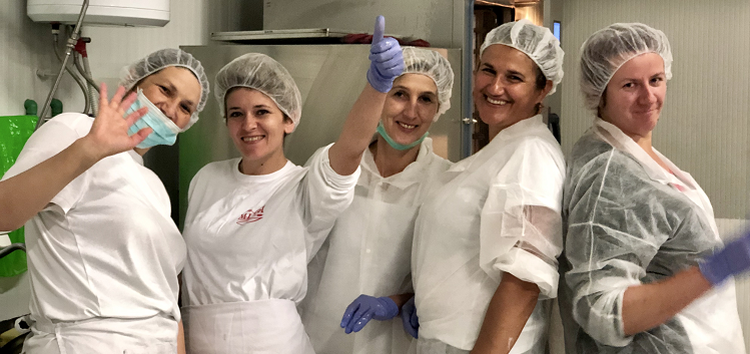EBRD and EU support Mlini bakery in Bosnia and Herzegovina

Investor
Mlini bakery

Location
Bosnia and Herzegovina

Investment
Modernisation of its equipment and operations

Donor
EU

“We are in constant pursuit of perfection, knowledge and improvement,” explains Nikolina.
How a family-owned business continued successfully into its third generation
Nikolina Jovanović is an executive manager of Mlini, a bakery company located in Čapljina, Bosnia and Herzegovina. Mlini is famous for its traditional pastry products sold across the country in Mlini bakeries and in supermarkets. The EBRD helped the company to invest in the modernisation of its equipment and operations, which led to further growth of the business.
The story of Mlini began almost a century ago in a small village once known as a mill and a trade centre. It was here where Nikolina’s great-grandfather bought an old water mill for flour grinding and started the business. The enterprise grew and the family opened their first bakery in Čapljina in the 1990s.
Today, Mlini has grown to a company employing over 90 people, applying the highest standards in production and bringing together tradition and modern technology.
The challenges of a growing business
“We are in constant pursuit of perfection, knowledge and improvement,” explains Nikolina.
“Our vision is to become a modern and efficient company with quality and professionalism ingrained across all business segments, from customer care to employee management, making us a reliable business partner and a socially responsible company,” she adds.
This need for self-improvement led them to the EBRD.
One of the first things they wanted to achieve was to cut energy costs by introducing energy efficiency measures. Their goal was to refurbish their facilities and replace old production machines and 20-year old cooling equipment.
Together with the EU, the EBRD supports the governments of the Western Balkans to modernise their energy sectors. They do this under the umbrella of the Regional Energy Efficiency Programme (REEP) funded by the European Union and implemented in partnership with the Energy Community.
The company applied for a loan funded by a specialised EBRD financing facility for energy efficiency investments: WeBSEFF – the Western Balkans Sustainable Energy Financing Facility. Through this facility, the EBRD provides credit lines to partner banks in the Western Balkans to on-lend to businesses and municipalities wanting to invest in energy efficiency and small-scale renewable energy projects. These are supported by European Union grant incentives.
“We replaced our old cooling machines with modern equipment which consumes much less energy. This investment paid off quickly, as it enabled us to realise up to 33 per cent savings in energy consumption,” adds Nikolina.
Organisational challenges
As the company grew, the need to define clear business processes and responsibilities became increasingly relevant. Furthermore, Mlini is located in an economically depressed region with an underdeveloped labour market, so finding and retaining quality staff proves difficult.
“Considering the challenges we were facing, we decided to invest in labour development by providing the necessary training to those with little or no work experience. We supported prospective employees in acquiring the business skills that were in demand in the local labour market,” says Nikolina.
The launch of new production lines and expansion of retail units brought further growth in the number of employees, bringing new organisational challenges. This is where the EBRD stepped in with support.
Working with the EBRD Advice for Small Businesses, the company implemented a new organisational structure and introduced new business processes. This resulted in more efficient work processes. The programme, supported by the European Union, provides advisory and technical assistance to companies in various business areas.
“Our team has a network of local and international experts that we connect with companies to help them improve in areas of need, be it organisational efficiency, a new marketing strategy,or anything else,” says Manuela Naessl, EBRD Head of Bosnia and Herzegovina.
Gilles Rebattet, Head of Operations for Economic Development, Natural Resources and Infrastructures, Delegation of the European Union to Bosnia and Herzegovina, says: “Together with EBRD, we are happy to help enterprises improve compliance with EU standards, in particular companies like the Mlini bakery, which understand that related investments in reducing energy consumption enhance their performance and increase their profitability already now.”
Asked what her business advice would be to a peer entrepreneur in Bosnia and Herzegovina, Nikolina says: “The key is to follow and adapt to market trends and ensure the organisation works both effectively and efficiently.” For this, she says, the right team is crucial: gathering dynamic, passionate people who share similar values and see challenges as opportunities will steer the business to success.



